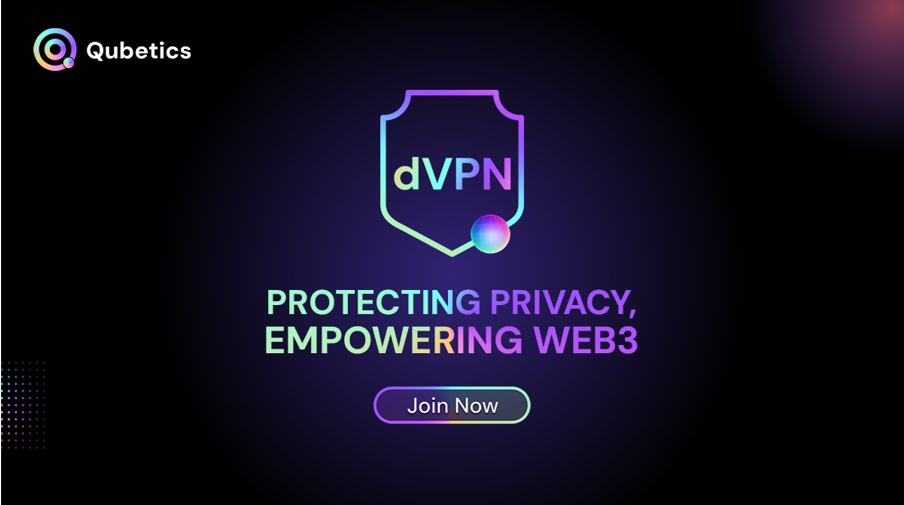How can customers protect their data from surveillance and centralised management as privacy concerns grow in the age of technology? Decentralised blockchain projects such as Qubetics $(TICS) are addressing this difficulty. While Near Protocol and Internet Computer emphasise decentralised infrastructure, Qubetics has drawn notice for its groundbreaking decentralised Virtual Private Network (dVPN), its presale success, and its focus on protecting online anonymity, with the number of online risks rising and the need for safe browsing expanding.
Qubetics Breaks $1 Million Presale Barrier in 24 Hours
Qubetics has been at the leading edge of the industry since its remarkable presale success, with analysts projecting up to 2000% ROI. By doing away with the vulnerabilities of centralised servers, Qubetics’ dVPN improves security over conventional VPNs by utilising a decentralised network of nodes. With its quantum-resistant encryption, the dVPN protects user data from increasing levels of internet restriction, enabling anonymous and unrestricted browsing. Qubetics $(TICS) tokens are anticipated to rise by 10% per week and 20% after the presale ends, bringing the price per token to $0.25 by the end.
Internet Computer Protocol‘s Major Ecosystem Updates
While Qubetics focuses on privacy with its dVPN, Internet Computer Protocol (ICP) has recently made strides in decentralising the web. ICP has introduced chain-key cryptography and canister smart contracts to enhance cross-chain interoperability, helping developers build decentralised applications across different blockchain platforms.
In market news, ICP’s price has increased by 0.89% in the last hour and 4.12% in the past 24 hours, though it’s down 13.48% over the past week. Currently priced at £6.25 per ICP, the cryptocurrency remains 98.69% below its all-time high of £478.52. Despite this, ICP maintains a market cap of £471.6 million with a circulating supply of 471.6 million ICP.
Near Protocol: Optimizing Blockchain for Developers
Near Protocol enhances blockchain usability with a low-cost, efficient platform for developers building decentralised applications (dApps). Its advancements in sharding technology allow it to scale while keeping fees low, making it a popular choice for developers compared to more expensive ecosystems like Ethereum. While Near focuses on improving developer infrastructure, Qubetics emphasises user-facing privacy solutions like its dVPN, prioritising individual security. Both contribute to blockchain innovation but with distinct focuses: Near on development efficiency and Qubetics on user privacy.
How to Secure $TICS Tokens Before Prices Increase?
If you want to secure Qubetics $TICS tokens during the presale, now is the time to act. The presale is currently in its second phase, and each subsequent phase will see a 10% price increase.
To participate:
- Visit the Official Qubetics Website: Head to Qubetics’ homepage and click “Join Presale.”
- Enter Your Email Address: Submit your email for updates.
- Connect Your Wallet: Link your crypto wallet (USDT or ETH compatible).
- Choose Your Payment Currency: Enter the amount of $TICS tokens you wish to purchase.
- Complete the Transaction: Approve the transaction within your wallet and confirm your purchase.
Conclusion
Qubetics, Internet Computer Protocol, and Near Protocol uniquely contribute to the decentralised industry. Qubetics has made a strong entrance with its presale, raising over $1 million and offering a practical dVPN solution to meet the growing demand for online privacy. In contrast, Internet computers focus on decentralising the web, and Near Protocol enhances scalability and usability for developers. With a current presale price of $0.012 per TICS token, Qubetics presents a compelling opportunity for investors looking to support a project that’s redefining digital privacy and security.
For More Information
Qubetics: https://www.qubetics.com/
ICP: https://internetcomputer.org/
Near Protocol: https://near.org/
Disclaimer: This is a sponsored press release for informational purposes only. It does not reflect the views of Times Tabloid, nor is it intended to be used as legal, tax, investment, or financial advice. Times Tabloid is not responsible for any financial losses.




